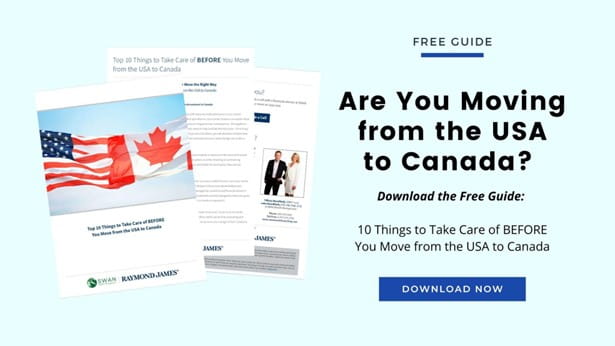Foreign Tax Credits in Canada and the U.S.
A Guide for U.S. Citizens and Green Card Holders in Canada
Written by John Woodfield, Portfolio Manager, CIM® CFP®

Navigating the intricacies of international taxation can feel like finding your way through a maze, particularly when your endeavours span the Canada-U.S. border. Though we can provide a good overview, it is critical that you also consult appropriate specialized tax accountants before taking any action.
Whether you're a Canadian entrepreneur setting up shop in the U.S. or an individual investor with American holdings, you may find yourself wrestling with the concept of foreign tax credits. Or perhaps you've experienced the looming anxiety of double taxation or fear of making mistakes and getting in trouble with the IRS.
You're far from alone in this struggle. As we decode the complexities of foreign tax credits, remember that when you assemble an excellent cross-border team, they'll take care of most of this work. You won't have to worry about this when you have proper guidance from an excellent cross-border accountant and financial advisor.
TABLE OF CONTENTS
- What Is a Foreign Tax Credit?
- How Do Foreign Tax Credits Work in Canada?
- How Do Foreign Tax Credits Work in the U.S.?
- Who Is Eligible for Foreign Tax Credits in Canada?
- Who Is Eligible for Foreign Tax Credits in the U.S.?
- Refundable and Non-Refundable Tax Credits
- Business-Income Tax Credit
- Non-Business Income Tax Credit
- Why Working With a Cross-Border Accountant Is a Good Idea
- Are PFICs Causing You Issues at Tax Time?
- How to Prevent Double Taxation in Canada
- Common Questions About Foreign Tax Credits in Canada and the U.S.
What Is a Foreign Tax Credit?
Foreign tax credits are tax relief mechanisms that help individuals and businesses avoid double taxation on income earned from foreign sources. These credits allow taxpayers to offset amounts paid to a foreign entity against their domestic taxes. The existence of these credits is designed to avoid duplicate taxation on the same income and promote fairness in taxation.
How Do Foreign Tax Credits Work in Canada?
Canadians who pay foreign taxes can generally claim a credit for taxes paid on employment, business, and investment income.
- The total foreign tax credit is usually limited to the lesser of foreign taxes paid or the Canadian tax that would have been payable in Canada on the foreign income.
- The tax credit can be claimed on the Canadian tax return by completing Form
Please note that Canada and the USA have precise rules and regulations around foreign tax credits. It is highly recommended that anyone looking at their situation consult with a qualified tax professional or cross-border financial advisor before making any decisions regarding this subject.
How Do Foreign Tax Credits Work in the U.S.?
These are the very basics of how foreign tax credits work in the U.S.:
- U.S. residents and some non-residents who have paid foreign taxes can claim a credit against their U.S. taxes.
- To claim the foreign tax credit, taxpayers should file Form 1116 and their U.S. tax return (Form 1040).
- If your tax credit exceeds the present year's U.S. tax liability, you may be able to carry over the excess amount to future years or elect to apply it to a preceding year.
Who Is Eligible for Foreign Tax Credits in Canada?
Foreign tax credits are available to Canadian residents, including individuals and corporations, who have paid or accrued foreign taxes on foreign-sourced income. Canada has tax treaties with many countries. These tax treaties may affect both the eligibility of a taxpayer and the calculation of the credits. To claim the credits, a taxpayer must have supporting documents such as a foreign tax return, tax statements or other evidence of foreign taxes paid. (+)
Who Is Eligible for Foreign Tax Credits in the U.S.?
Typically, the United States allows citizens, resident aliens, green card holders and those that meet the Substantial Presence Test to utilize the tax credits. In each case, the individual or business must have paid or accrued foreign taxes on foreign income. This accrual includes income from employment, dividends, interest, rents, and other types of foreign-sourced income. Note that only taxes legally and actually imposed are eligible.
Refundable and Non-Refundable Tax Credits
Refundable tax credits reduce your tax liability to zero and can result in a refund of taxes if the credit amount exceeds the tax liability. Refundable tax credits can provide a direct cash benefit.
Refundable Example:
If a taxpayer were to owe $2,000 in taxes and has a $2,500 refundable credit, the taxes would be reduced to zero, and the taxpayer would receive a $500 refund.
Non-refundable Example:
Non-refundable tax credits can only reduce a taxpayer's tax obligation to zero. In other words, any amount over the tax liability is not recovered. There is no cash recovery.
Business-Income Tax Credit
Business-income tax credits are designed to avoid double taxation and incentivize activities that help economic growth and job creation. Canadian businesses may be eligible for foreign tax credits if they have paid or accrued foreign taxes on income earned in a foreign country, similar to the Canadian corporate tax system.
The credit is the lesser of the foreign taxes paid and what would be payable on foreign income. There are many detailed rules and regulations around this topic beyond the scope of this informational overview.
Non-Business Income Tax Credit
Fortunately, Canada allows taxpayers who receive non-business income to receive a tax credit so that they can avoid double taxation. This tax credit applies to those earning income from foreign sources, such as investment, rental, or employment income earned and taxed outside of Canada. The process to claim these credits is the same as discussed earlier in this article.
Why Working With a Cross-Border Accountant Is a Good Idea
- International taxation expertise isn't something you can get through Google research. Tax laws are intricate, specialists are needed to ensure all the i's are dotted and t's are
- Personalized strategies are Each person's situation is different, and the approach must fit a client's needs.
- Cross-border businesses need additional Accountants and advisors will help you with pricing, cross-border transactions, relevant treaties, and payroll.
- Legacy, estate and succession planning are essential and require a Those that have assets in multiple countries run a serious risk of running afoul of gift laws and inheritance rules. An accountant and advisor team can help a client manage these intricacies.
Are PFICs Causing You Issues at Tax Time?
A PFIC is an entity that meets eight of the income tests of the asset test outlined in the U.S. tax code. These are very common. Canadian mutual funds and exchange-traded funds are typically considered PFICs and can cause a lot of issues at tax time for those that hold them. Form 8621 is used to provide details on PFIC holdings and it determines the tax treatment.
PFICs can result in unfavourable tax treatment though a QEF election can be made to mitigate the negative tax effects.
Download the Cross-Border Guide
How To Prevent Double Taxation in Canada
The government of Canada has created tax treaties with over 90 countries, including the USA, to reduce double taxation. These treaties generally enable Canadian taxpayers to utilize a credit for foreign taxes paid. Canada operates on a territorial tax system, meaning residents of Canada are taxed on their worldwide income. However, due to tax treaties, some income earned in certain foreign countries may not be subject to Canadian taxes.
Common Questions About Foreign Tax Credits in Canada and the U.S.
How much income does the U.S. foreign tax credit allow?
The credit is usually limited to the lesser of the foreign taxes incurred or accrued or the U.S. tax liability that would be attributed to the foreign income. The credit cannot exceed the U.S. tax liability on the income.
Who qualifies for foreign tax credits?
Individuals and businesses can qualify. The eligibility depends on a number of factors, including the country where the income was sourced, the nature of the income and the residency status of the taxpayer.
What are the Canadian foreign tax credits?
The tax system in Canada enables Canadian residents to reduce their Canadian tax liability through claiming credits for foreign taxes paid. This income includes employment, business, rental, investment, and capital gains where foreign property has been disposed of.
Are there any foreign tax credit calculators?
Yes, there are a variety of calculators that can be used. Though these can be helpful for estimating credits, they may not fully capture all the necessary items to satisfy the tax rules.
Are foreign tax credits refundable in Canada?
Canadian tax regulations generally mean that foreign tax credits are non-refundable. In short, the credits can offset your tax liability, but the refund isn't in excess of the tax liability. There are special situations where tax credits can be refunded or carried forward. These are generally special cases based on a specific treaty with a specific country.
Summary of Key Points:
- It is important to understand how to avoid double taxation using the foreign tax credit
- It is vital to keep clear and detailed
- The tax system for credits is complex, and working with a qualified cross-border advisory team and cross-border accountant is a must.
- The foreign tax credit system is designed to help you avoid double
- Make sure you’re not invested in PFICs as that can cause taxation
Next Steps
If you’re a Canadian resident or are planning on moving to Canada and need assistance with moving and optimizing your investments, estate planning, wealth management and portfolio management, please get in touch. At SWAN Wealth, we specialize in Canadian financial planning, cross-border financial planning and cross-border wealth management.
More Cross-Border Financial Planning Articles and Guides
If you’re planning a cross-border move, these articles and guides will help you simplify your move and ensure you’ve covered everything.
Moving to Canada From the U.S. Cross-Border Estate Planning Guide
Certified Financial Planner in Canada - Finding a Fiduciary
Roth IRA Canada - How To Manage Your Investments Across the Border The Ultimate Financial Planning Resource for Dual Citizens in Canada
About the Author
John Woodfield is a Financial Management Advisor (FMA), a Chartered Investment Manager (CIM), and a Certified Financial Planner (CFP), and in 2007, was inducted as a Fellow of the Canadian Securities Institute (FCSI). As a portfolio manager and CFP®, he works with clients across Canada. John Woodfield’s clients are families, individuals and business owners who
understand the importance of comprehensive wealth and investment plans driven by the lifestyle they want to lead.
Schedule a Call
Schedule a 15-minute introductory call with SWAN Wealth Management. Click here to schedule a call.





